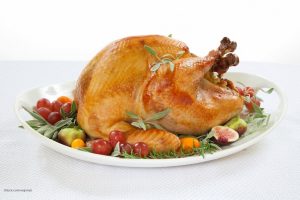Consumer Reports is offering food safety advice when you’re cooking some type of meat for the holidays. Ham, beef and pork roasts, turkey, and duck are usually only prepared once or twice a year, so most cooks are unfamiliar with the food safety risks posed by these foods.
 When buying meats from a stand-alone refrigerator case, don’t take the package on top. And if the packages extend above the top of the case, there’s a very good chance that meat has entered the temperature danger zone above 40 degrees F. Francis Largeman-Roth, R.D., said, “those cases only keep things truly cold as far as the walls of the case go up.”
When buying meats from a stand-alone refrigerator case, don’t take the package on top. And if the packages extend above the top of the case, there’s a very good chance that meat has entered the temperature danger zone above 40 degrees F. Francis Largeman-Roth, R.D., said, “those cases only keep things truly cold as far as the walls of the case go up.”
Store these large cuts of meat properly. A fresh turkey should be stored in the refrigerator for only one or two days. Pork and beef roasts can be in the fridge for three to five days. Duck and goose should be stored no longer than three days. And make sure the fridge is set below 40 degrees F.
Always thaw frozen meats in the refrigerator, not on the counter. You can defrost in a sink full of cold water, but the water must be changed every 30 minutes to keep the meat at a safe temperature as it thaws. If you want to thaw meat in the microwave, it must be cooked immediately afterward.
Never rinse any type of raw meat before cooking. That will splatter droplets of water around the kitchen and the sink. Proper cooking is the only way to kill pathogenic bacteria.
Finally, cook the meat to a safe internal temperature. Only 39% of Americans use a food thermometer to check the final temperature of meats. You can’t tell if meat is properly cooked by the color or texture.




